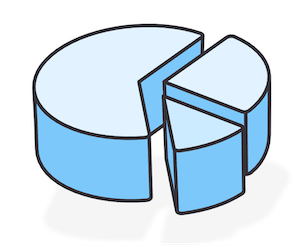
We’ve all been there. You have an essay due tomorrow, you’ve known about it for 2 weeks, yet somehow you’ve managed to leave it until the very last minute. It’s 11pm the night before, you stare at the blank page panic stricken, cursor blinking and you question why you do this to yourself. The next morning you’ve submitted it with 3 minutes to spare, exhausted beyond belief and promise yourself you will start earlier next time. Except you don’t.
Procrastination is a repeat offender in the typical student’s life. Let’s be honest, you’re probably doing it now. Evidence shows that up to 50% of students struggle with chronic procrastination.1
Being such a widespread problem, you may be wondering, “How do you beat procrastination living in this age of distraction?” That’s the million-dollar question! In this blog post we share our top 5 tips to boost your productivity. And if you’re in denial and claim that you’re not procrastinating, you just work better under pressure, this is especially for you.

1. Break it down
When a task seems daunting or requires considerable effort, it’s easy to postpone it and convince yourself you’ll complete it later. But this cycle perpetuates, days pass and before you know it, it’s the night before and you grudgingly succumb to the fact that you won’t be getting any sleep.
Rather than trying to tackle an objective all at once, try breaking it down into stages to prevent it from becoming too overwhelming.
Evidence shows that this smaller-step approach makes it more likely that you will accomplish a task through a phenomenon known as the Zeigarnik Effect. Russian psychologist, Bluma Zeigarnik, observed people carrying out a series of tasks, some of which they were interrupted from completing. When the test subjects were asked to recall these tasks, the ones which were interrupted were twice more likely to be remembered than those which were completed.2
This Zeigarnik Effect was also observed in a study conducted in the University of Mississippi whereby participants were asked to complete a challenging puzzle but were intentionally stopped before completing it. Despite the study being over, 86% returned to the task.3
One of the main obstacles to overcome procrastination is simply starting. By taking the first step, no matter how small, you are more inclined to complete it because the unfinished task will persist at the back of your mind.

2. Don’t be so hard on yourself
Recent research has shown a positive and significant correlation between perfectionism and academic procrastination.4 In a sample of 200 students, it was found that students with higher ratings of perfectionism procrastinated more than students with lower ratings. This fear of messing up and not doing a task to the standard expected increased pressure and prevented them from even starting. Reminding yourself that it’s normal to make mistakes will ease off the pressure on you, providing a calmer and easier mindset to begin. You’re only human after all!
But even if you don’t consider yourself a perfectionist and still constantly find yourself putting off work until its too late, it has been shown that the simple solution to break the cycle is to be kind to yourself.
A study conducted on a sample of first-year undergraduates found that those students who forgave themselves for procrastinating while preparing for their first exams were less likely to procrastinate in studying for the second exam.5 How does this work? The authors found that the feeling of guilt may act as a deterrent to take action the next day. However, self-forgiveness is often accompanied with self-reflection and commitment to change behaviour. So practice some self-love, allow yourself to make mistakes and focus on the future. Tomorrow is a new day!

3. Reward yourself
Maybe this situation sounds familiar. You have a large deadline looming that you need to get started on, clearing the entire day to give yourself sufficient time to get it done. You start off with good intentions, but then with so much time ahead you might start watching one Youtube video, or scroll through your Instagram feed. 1 minute turns into 5 which turns into an hour and you still haven’t even started.
If this sounds like you, try making the task at hand fun by rewarding yourself every time you achieve a small goal. This can be anything from making a snack after completing a lecture to a few minutes on social media or a 30-minute walk outside. In this way, you’ll be motivated because the sooner you get started, the sooner you get your reward and the less burnt out you are likely to feel.

4. Alter your thinking
A common trait in most human beings is that we crave instant gratification, often prioritising tasks that will give an immediate reward and postpone potentially more important but strenuous tasks because the reward will be obtained in the distant future.
This is an example of what behavioural economists call ‘present-bias’6 and something every student knows all too well. You know you should be studying for your final next week but you figure one more episode on Netflix won’t hurt. So you sit there binge watching your favourite show knowing full well that this simple pleasure could be even more enjoyable if you could do it stress free.
A simple method to trick yourself into working is to think of future events in terms of days, not years or months. A study by Lewis and Oyserman7 found that by manipulating the time metric and thinking in terms of days, people were more likely to take action sooner. Although technically the same amount of time, this switch in mindset makes the future seem less distant and creates a stronger connection between their current and future self.

5. Use a productivity-boosting app
And if you’ve tried all the above and still can’t bring yourself to start in a timely manner then don’t fret my friends, we’re here to help!
Ironically, despite being a major contributor to our shortening attention spans, technology also provides a solution to overcome this. There are a plethora of apps available that can block social media and websites for a limited period of time, allowing you to focus on the task at hand.
This would be great if that was the only distraction. Whilst studying, you might have multiple windows open on your desktop: lecture slides, Youtube, Word and your internet browser. Not only does this clutter your screen, but the constant switching between windows increases the chances of distraction.
This is where Supernotes comes into play. We simplify learning by providing a unified platform to collaborate and take notes, in a distraction-free unified interface. We built it specifically with students in mind, so try it for yourself here!
And there you have it, our top 5 tips that will have you waving goodbye to procrastination for good! We’d love to hear how you get on and your methods to help you work more productively so feel free to tweet us @supernotesapp.
- Eckert, M., Ebert, D., Lehr, D., Sieland, B. and Berking, M. (2016). Overcome procrastination: Enhancing emotion regulation skills reduce procrastination. Learning and Individual Differences, 52, pp.10-18.↩
- Zeigarnik, B. (1927). On Finished and Unfinished Tasks. Psychologische Forschung, 9.↩
- McGraw, K. and Fiala, J. (1982). Undermining the Zeigarnik effect: Another hidden cost of reward. Journal of Personality, 50(1), pp.58-66.↩
- Jadidi, F., Mohammadkhani, S. and Tajrishi, K. (2011). Perfectionism and Academic Procrastination. Procedia - Social and Behavioral Sciences, 30, pp.534-537.↩
- Wohl, M., Pychyl, T. and Bennett, S. (2010). I forgive myself, now I can study: How self-forgiveness for procrastinating can reduce future procrastination. Personality and Individual Differences, 48(7), pp.803-808. ↩
- O’Donoghue, T. and Rabin, M. (1999). Doing It Now or Later. American Economic Review, 89(1), pp.103-124.↩
- Lewis, N. and Oyserman, D. (2015). When Does the Future Begin? Time Metrics Matter, Connecting Present and Future Selves. Psychological Science, 26(6), pp.816-825.↩

Take notes effortlessly
Join thousands of happy notetakers!